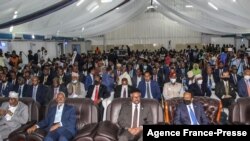It’s been one year since the four-year term of Somalia’s president, Mohamed Abudllahi Mohamed, also known as Farmaajo, ended. Since then, parliamentary and presidential elections have been repeatedly delayed; protests have ensued and been met with violence; journalists have been harassed and detained; political reforms have stalled; and al-Shabaab terrorists have continued targeted and indiscriminate attacks on civilians.
Over the past year, the United States repeatedly warned that the political stalemate regarding elections in Somalia must end if there is to be hope of attaining peace and prosperity for the people of Somalia.
On February 8, the first anniversary of the expiration of the Somali president’s term in office, Secretary of State Antony Blinken announced visa restrictions on “current or former Somali officials or other individuals who are believed to be responsible for, or complicit in, undermining the democratic process in Somalia, including through violence against protestors, unjust arrests or intimidation of journalists and opposition members, and manipulation of the electoral process. Immediate family members of such persons may also be subject to these restrictions,” he added in a statement.
The policy of restricting the issuance of visas was made under Section 212(a)(3)(C) of the U.S. Immigration and Nationality Act. In this instance, it applies, Secretary Blinken said, “to individuals who have played a role in procedural irregularities that have undermined the electoral process, who have failed to follow through with their obligations to implement timely and transparent elections, and who have targeted journalists and opposition party members with harassment, intimidation, arrest, and violence.”
Somalia has long confronted multifaceted challenges, including political instability, war, drought, and pestilence. According to the UN’s projections for 2022, an estimated 7.7 million Somalis (nearly half of the country’s population) will require humanitarian assistance and protection. All Somalis need a government chosen by them that will respond to their needs.
“Somalia’s national and federal member state leaders must follow through on their commitments to complete the parliamentary process in a credible and transparent manner by February 25, which will further lay the groundwork for responsive governance in Somalia,” Secretary of State Blinken said. “The United States strongly supports the Somali people, and we are committed to working together to advance democracy and mutual prosperity for both of our countries.”
Elections Necessary for Peace in Somalia

Over the past year, the United States repeatedly warned that the political stalemate regarding elections in Somalia must end if there is to be hope of attaining peace and prosperity for the people of Somalia.













